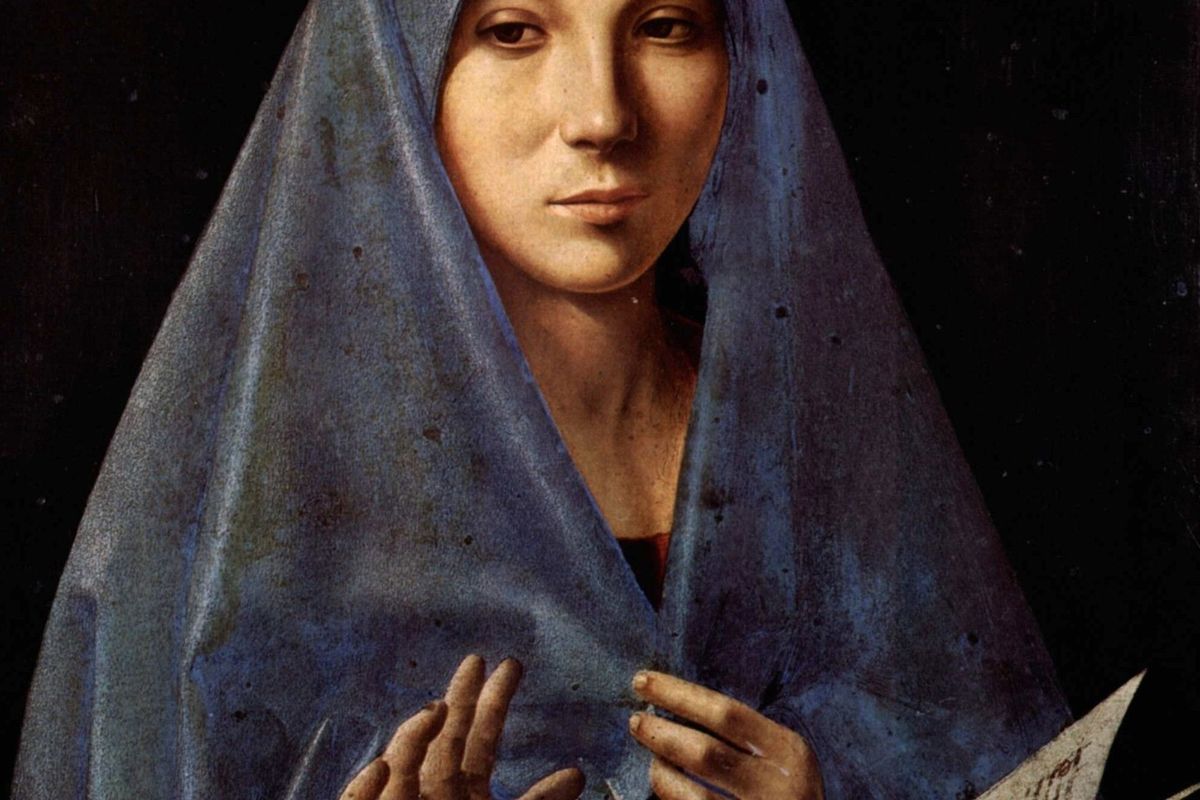Luke Donahue, a 2017 graduate of the University of Notre Dame, is now a postulant with the Congregation of Holy Cross. While at Notre Dame, Luke studied Theology and German with a minor in Medieval Studies. In the following interview, he speaks on his relationship with the Blessed Mother, generously sharing graced insights gathered from years of devotion.
Can you describe your relationship with Mary, and how it has changed over time?
My relationship with Mary has definitely grown throughout my life. When I was a child, I prayed the Hail Mary most days, but it was kind of just another prayer. I appreciated Mary’s role as Mother of God, but I didn’t realize the extent to which she, as mother of all Christians, can have a personal relationship with us. I think the first time my family prayed the rosary together was after St. John Paul II passed away. He had really promoted the rosary, so my mother gathered us around the table and we all prayed the rosary together. It was a very moving experience. I would have been around ten years old and I remember that very distinctly.
I remember reading that a lot of saints promoted the rosary, so I started praying the rosary more my junior year of high school and it was very peaceful. It was that peace that drew me in deeper. Now it’s become part of my daily routine: getting in touch with my mother and letting her help me put on the life of Christ.
The biggest step forward in my relationship with Mary was my freshman year here at Notre Dame, when I got involved with a group called the Militia of the Immaculata. The Militia of the Immaculata, also known as the Mission of the Immaculata (MI), is an international organization founded by St. Maximilian Kolbe. The mission of the MI is to bring all souls to Christ through Mary. St. Louis de Montfort and other saints have praised Mary as the surest, safest and quickest way to Christ. Kolbe took up that idea and used it to promote bringing all souls to Christ through Mary, by means of prayer and evangelization.
Do you have any favorite Marian spiritual practices?
In terms of the regular prayers and devotions you have the rosary, and you also have the Miraculous Medal. Kolbe called the Miraculous Medal a silver bullet that we use to fight the devil. Our Lady herself suggested that we wear it and said, "Whoever wears this will receive many graces." You can’t really get a stronger suggestion than from Our Lady herself!
Total Consecration [1], to me, is a very powerful spirituality, because through it you are following in the footsteps of Christ and the apostles by making yourself entirely obedient to Mary. Through total consecration, you entrust yourself to Mary, knowing that she, as a mother, will take care of you. Since she is the Immaculate Conception, her will is perfectly conformed to God’s will, and when you put yourself in her hands, you give her all your prayers, actions, and sacrifices, and you say, "It’s in your hands, do with it what you want." Of course, this doesn’t mean you can’t pray for people, but you give her the last word, and that’s a very powerful entrustment. De Montfort talks about how Mary takes our prayers and perfects them. She weeds out that last bit of clinging to self before she presents them to Christ, and she magnifies them with her own prayers so what we have is not only our own creation, but something created with the help of Mary.
Here at Notre Dame we have some advantages because we have so much beautiful imagery around campus. The reason Fr. Sorin put Mary on top of the dome was so that she could serve as a prayer—that the campus, and each soul who is part of the community, would be entrusted to Our Lady. You can walk across God quad and be struck by the beauty of Our Lady, allowing her to remind you of the presence of God, and of all the blessings God has given us.
I know many people have a difficult time praying the rosary contemplatively. Did you ever experience this difficulty?
The rosary does sometimes feel very difficult. I think part of that is we’re human, and we have many distractions in the world, but that’s part of the beauty of the rosary. Even if at the beginning you find yourself distracted, it does take some time. It’s not an hour, but it’s a solid twenty minutes, and ideally by the end you start to put yourself into that [contemplative] state. Part of praying the rosary is asking Mary to help you with your meditations.
One trick I found this last year when I was doing some research on Marian spirituality was a medieval practice of Gospel meditation. To help your meditation, you imagine certain feelings of Christ or Mary. The Sorrowful Mysteries are probably one of the easiest to do this with. Imagine yourself in the place of Christ suffering, or in the place of Mary, which is easier for a lot of people. Imagine the sorrow: "What if I were Mary and I saw Christ suffering in that way? How would I feel? What would I do?" Allow yourself to be taken into Mary and into her life—it’s very powerful.
Mary doesn’t appear very often in the Gospels, but are there any moments in scripture, when she does appear, that are particularly meaningful for you?
For me, I think really the most important Gospel passage for Mary, and even the most important passage overall, is the Annunciation. "Full of grace," in Greek, is indicative of the Immaculate Conception, but it’s all about the Annunciation. The gifts that Mary was given beforehand were given to her so that she could give an entirely free "yes" to God, and all the gifts that were given after were given in light of the Annunciation and her whole raising of Christ. If it weren’t for the Annunciation, she wouldn’t have borne Christ, and if not for the Annunciation, we wouldn’t be here today as Christians. There’s nothing in the Christian faith if there isn’t the Incarnation, and so our whole theology reaches back to the Annunciation.
Can you speak about some misunderstandings of Mary you have come across in conversation with others?
I think a lot of Catholics are concerned that praying to Mary takes away from our prayer to Christ. Why not just pray to Christ? In one of Fr. Donald Calloway’s books, he compares Mary to a painting. Imagine you’re at an art show, and this painter is standing next to his masterpiece. Here it is, his most beautiful work, and you spend the whole time talking to the painter about how great he is, and you miss the masterpiece! The painter wants you to appreciate the work, and likewise God wants you to appreciate the masterpiece of His Blessed Mother.
Now imagine you marry into a family and go to Easter brunch with them. I would hope your spouse would have you talk with more than just him or her, because you should be talking with the whole family. Likewise, even though we have a spousal relationship with God, God wants us to be with His whole family. We’re with Christ, but we’re also with Mary and all the saints. Knowing that it’s a family deal, you need to be present to the rest of the family, and let them be present to you.
Has Mary played a role in your ongoing vocational discernment?
She definitely played a role, even when it was subtle and unnoticed. I’ve given my life to Christ through Mary, so I trust that she guides my life even when I don’t perceive it. God does work through Mary as Mediatrix of all Graces, and she does really look out for us, and so I think she was guiding me all along, even before I really noticed it.
She’s present in two ways. First, she’s encouraging us by her own role. We see that Mary gave her great fiat to God, not knowing what it would be like. She said ‘Be it done unto me according to Thy word,’ and knew immediately that she would bear the Christ, but she didn’t know exactly what that meant. Through her life, she came to a greater understanding of that proclamation, and that’s why she’s always pondering things in her heart. The idea of being ready to assent to God, saying, ‘This is your will, let it be done unto me,’ is very powerful for anyone who’s discerning a vocation to priesthood or religious life, married life, or a career. By following Mary’s example we’re able to take that step of saying, ‘I will trust God’s will, and I know that things will work out.’ Second, when you have a bad day, or you’re stressed or starting to doubt yourself, you can run to Mary and just talk to her as you would to your mother - let her take you under her mantle. It’s a very beautiful, very personal relationship you can have with Mary because she is God’s mother, but she is also your mother.
[1] Total Consecration to Jesus through Mary is a spiritual practice formulated and promoted by St. Louis de Montfort. Fr. Michael Gaitley’s popular devotional book, 33 Days to Morning Glory, is based on de Montfort’s consecration.

